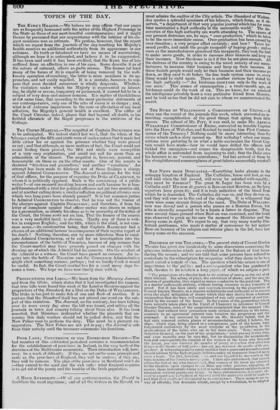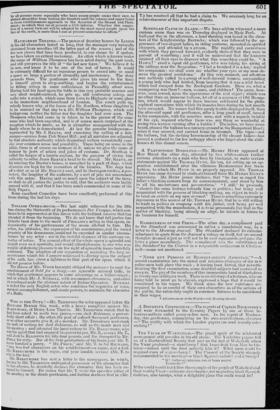DECORUM OF THE THE ATRES. —The present state of Covent Garden Theatre
has given rise incidentally to some discussions concerning the grievous indecencies which are exhibited in the Saloon of that house during the season ; and we are told that some persons have refused to contribute to the subscription for reopening what they deem to be to a
great extent a temple of vice. The question which has arisen is one of 13 - importance to the public ; and a correspondent who has pondered it well, devotes to its solution a long paper, of which we subjoin a part.
" The proprietors of a theatre look to the making of money as the end of all their labours. The acting of plays, the exhibition of shows, and the easy ad- mission of prostitutes, they regard as means conducive to the great end. This is a matter sufficiently obvious, without having recourse to any formality of proof. But it has been lately and expressly avowed, by the proprietors of Covent Garden Theatre, in a manner so deliberate and authentic as to remove even the slight mitigation of shame which they may derive from a humane supposition that the base evil complained of was only connived at and tole- rated by the owners of the house. In the course of the proceedings which have recently taken place in the Court of Chancery in reference to Covent Garden Theatre, some of the proprietors complained that the manager (Mr. Harris) had without their permission made certain alterations in the house, contrary to an agreement entered into between the proprietors and the manager. It was answered by counsel on Mr. Harris's behalf, that he had only removed certain places of accommodation, called, I believe, the slips ; which slips, being 'placed in a conspicuous part of the house, were frequented exclusively by the most irregular of the prostitutes, to the great offence of the ladies who sat in the dress circle. True, rejoins the Solicitor-General, on the part of the proprietors ; ' what you say is very true, and your morality may be very fine, but by diminishing the accommoda- tion and consequently the number of the women of the town who frequent the house, you also diminish the number of young men whom that attractant bring-s to the theatre at half-price ; hoc eat, you diminish the profits of the pro- prietors'. It will perhaps not be easily credited that a grave and learned counsel should address to the highest judge in this country an argument founded upon such a topic. The fact, however, lA so, and was reported to the world at the time in some of the London newspvers. 1 have also understood, (but cannot affirm the fact of my own knowl cd;e), that women of the town are admitted to the theatres upon cheaper terms than any other persons, excepting, of course, those individuals whose relation to the establishment entitles them to admission without paying any thing. In these circumstances, it is quite ab- surd to expect any mitigation of the evil until the managers shall be made to feel that their profits are diminished by its continuance. There seems to me no way of effecting this desirable object, except by a resolution, to be adopt4 by all persons more especially who have young people under their care, to abstain altogether from visiting the theatres until the saloons and upper boxes in those establishments approach to the decorum of the Strand and Fleet- street; to which they are at present a little inferior. Whether this suggcs- lion of a moral turn-out will be adopted by the most moral people upon the face of the earth, is more than I can at present undertake to affirm."



















 Previous page
Previous page